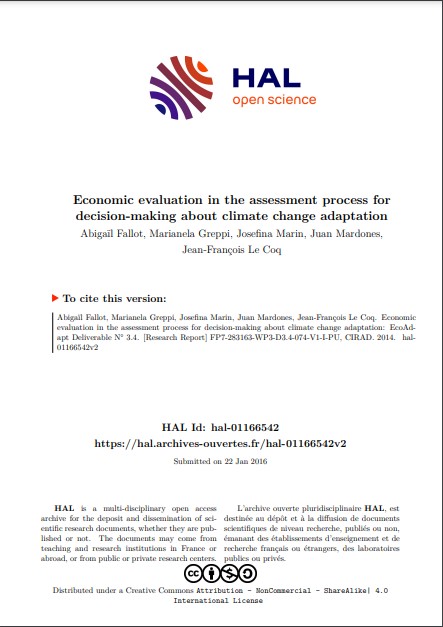Economic evaluation in the assessment process for decision-making about climate change adaptation
Bosque Modelo:
Jujuy
Temática:
Cambio climático
Tipo de documento:
Libro
Resumen
The economic assessment of climate change adaptation basically consists in balancing costs and benefits of actions considered when addressing climate change (CC) threats. The purpose of economic evaluation in the assessment process of CC adaptation actions is essentially to provide figures for the comparison of different possibilities. In the context of the 3 EcoAdapt south American sites (Los Perico-Manantiales watershed in Argentina – BMJ, Zapoco watershed in Bolivia – BMCh and Alto Malleco in Chile – BMAAM), economic evaluation is to rely on a shared understanding of local contexts and the economic drivers of current dynamics. We focus on specific actions considered in these contexts so as to address unsustainable dynamics. The present report D3.4 provides a framework for economic evaluation: its context and the approach under development; the elements of costs and benefits that enter the analysis; and how uncertainty and irreversibility can be accounted for when using economic evaluation results. The initial panorama of the context of the economic evaluation recalls synthetically what we know about the territories and their people in terms of scales, activities and living conditions and about the extent to which they are affected by climate. Such introduction aims at facilitating the understanding of the types of actions considered for climate change adaptation. Then the economist standpoint on climate adaptation is explained and the perimeter of the evaluation is defined: 15 actions in BMJ, 11 in BMCh and 9 in BMAAM.
Información Bibliográfica
Autor:
Abigaïl Fallot, Marianela Greppi, Josefina Marin, Juan Mardones, Jean-François Le Coq
Año:
2014
País :
Argentina
Páginas:
-
Edición:
-
Idioma:
Ingles
Palabras claves
Economia, Cambio climático





